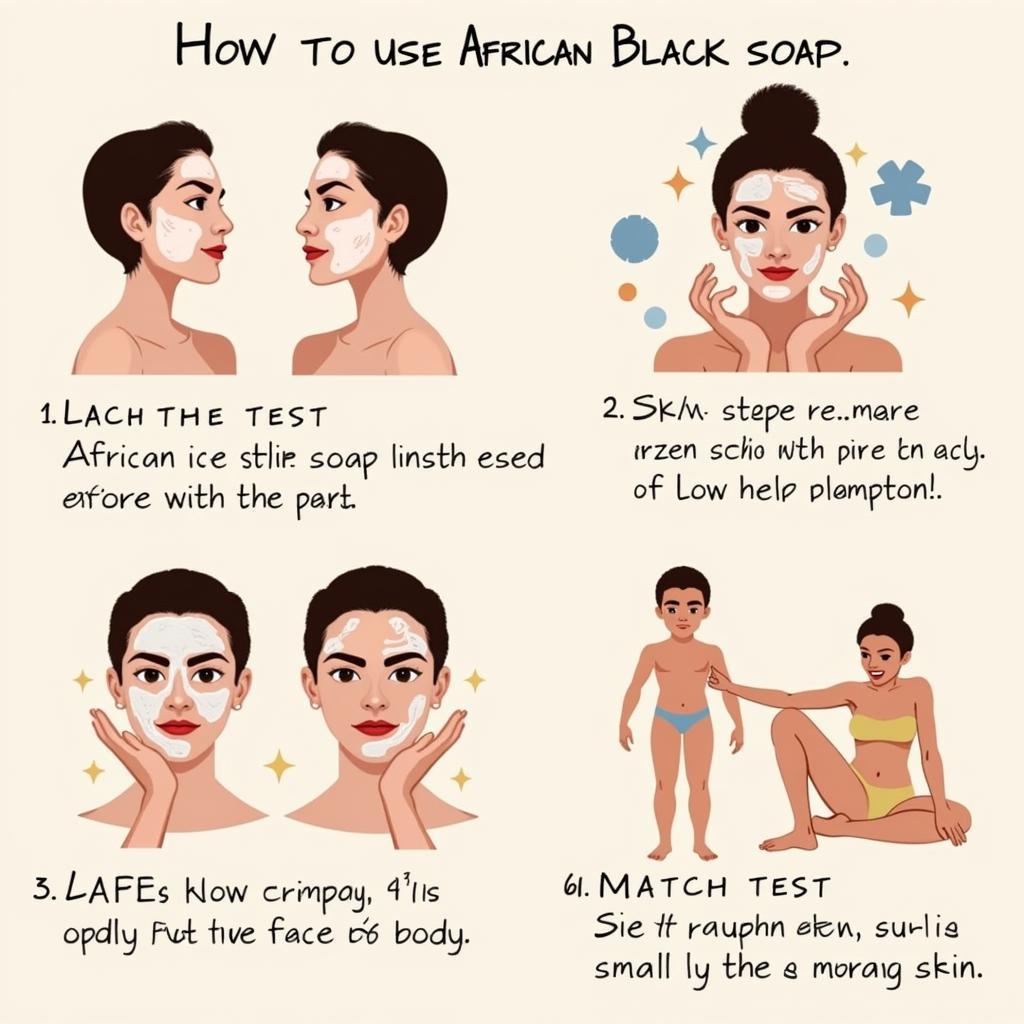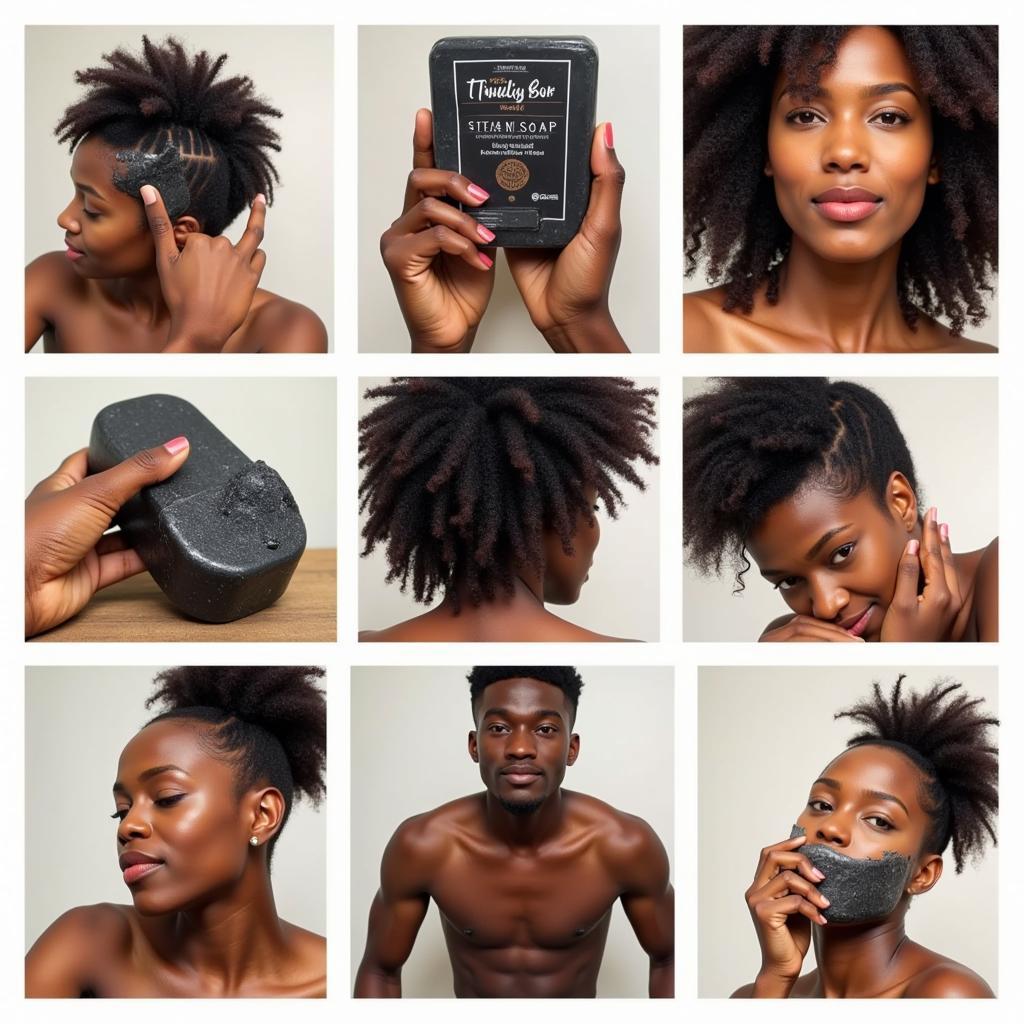Does African Black Soap Really Work?
African Black Soap Does It Work? This age-old beauty secret from West Africa has taken the world by storm, promising everything from clear skin to luscious hair. But amidst the hype, it’s crucial to separate fact from fiction. This article dives deep into the world of African black soap, exploring its origins, benefits, and potential drawbacks, to help you determine if it’s the right choice for you.
Unmasking the Mysteries of African Black Soap
African black soap, also known as “Anago soap” or “Alata Samina,” isn’t your typical bar of soap. Unlike commercially produced soaps filled with harsh chemicals, traditional African black soap is handcrafted using time-honored recipes passed down through generations. Key ingredients often include plantain peels, cocoa pods, palm kernel oil, shea butter, and sometimes, ashes from burnt plants like cocoa pods or palm leaves. This unique blend gives the soap its characteristic dark brown or black color and provides a range of potential benefits for the skin and hair. Check out our african black soap acne article for more details on acne treatment.
African Black Soap Benefits: Fact or Fiction?
So, african black soap does it work? Many proponents claim African black soap can treat various skin conditions, including acne, eczema, and psoriasis. The soap’s high alkali content helps to cleanse the skin deeply, removing dirt, oil, and makeup. The shea butter and other natural oils provide moisturizing properties, leaving the skin feeling soft and supple. Some users even report that African black soap has helped fade dark spots and hyperpigmentation. However, it’s important to note that scientific research supporting these claims is limited. While anecdotal evidence abounds, more studies are needed to confirm the efficacy of African black soap for specific skin conditions. You might also be interested in reading our african black soap reviews for psoriasis for specific reviews related to psoriasis.
Does African Black Soap Work for All Skin Types?
 African Black Soap for Different Skin Types and Usage Instructions
African Black Soap for Different Skin Types and Usage Instructions
While generally considered safe, African black soap may not be suitable for everyone. Its high alkalinity can be drying for some, especially those with sensitive skin. It’s recommended to start by using the soap sparingly and gradually increasing frequency as your skin adjusts. A patch test on a small area is always advisable before applying it to larger areas. Learn more about who makes this soap in our african black manufacturers article.
How Often Should I Use African Black Soap?
The frequency of use depends on your skin type and individual needs. Some people use it daily, while others find that using it a few times a week is sufficient. Pay attention to your skin’s response and adjust accordingly.
Can African Black Soap Lighten Skin?
While some users report skin lightening effects, it’s crucial to understand that African black soap doesn’t contain bleaching agents. Any perceived lightening might be due to the removal of dead skin cells and impurities, revealing brighter, healthier skin underneath.
Beyond Skincare: The Versatility of African Black Soap
 African Black Soap Uses for Hair and Body
African Black Soap Uses for Hair and Body
African black soap’s benefits extend beyond skincare. Many users find it effective as a shampoo for cleansing the scalp and hair. Its natural ingredients can help soothe an itchy scalp and remove product buildup. Some also use it as a body wash or shaving soap, appreciating its gentle cleansing action. You can also check out our article on african delay cream for other personal care products. Discover more about the captivating african flame tree on our website.
Dr. Abena Osei, a renowned dermatologist specializing in traditional African skincare, notes, “African black soap offers a natural alternative to commercial soaps laden with chemicals. Its unique blend of ingredients can be beneficial for many, but it’s essential to listen to your skin and adjust usage as needed.”
Another expert, herbalist Kofi Asante, adds, “The traditional methods of making African black soap are crucial for preserving its inherent qualities. Authentic African black soap should be handcrafted using natural ingredients.”
African Black Soap: Does It Work? The Final Verdict
So, african black soap does it work? The answer is nuanced. While anecdotal evidence and traditional usage suggest its effectiveness for various skin and hair concerns, further scientific research is needed. Its natural composition, gentle cleansing properties, and moisturizing potential make it a worthwhile option for many, particularly those seeking a natural alternative to conventional soaps. However, it’s essential to consider individual skin type and adjust usage accordingly.
FAQ
- Is African black soap suitable for sensitive skin? It can be, but start with infrequent use and monitor your skin’s reaction.
- Can I use African black soap on my face? Yes, but be mindful of its drying potential, especially for sensitive skin.
- Where can I buy authentic African black soap? Look for reputable suppliers specializing in handcrafted, natural products.
- What is the shelf life of African black soap? Properly stored, it can last for several months.
- Does African black soap smell? Its scent is earthy and natural, varying depending on the ingredients.
- Can African black soap help with acne scars? Some users report improvement, but more research is needed.
- Is African black soap vegan? Traditionally, yes. However, always check the ingredients list to be sure.
For further assistance, please contact us at Phone Number: +255768904061, Email: kaka.mag@gmail.com or visit us at Mbarali DC Mawindi, Kangaga, Tanzania. Our customer service team is available 24/7.


